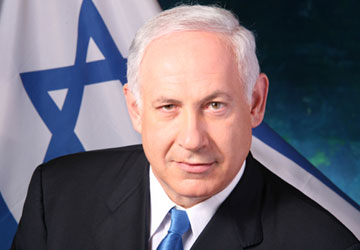Trump Faces Foreign Policy Choices on Eve of Netanyahu Visit
By Ira Stoll | February 13, 2017, 16:08 EST
 Benjamin Natanyahu, prime minister of Israel
Benjamin Natanyahu, prime minister of Israel With Israeli Prime Minister Benjamin Netanyahu arriving in Washington this week to meet with President Donald Trump and the press full of headlines about turmoil at the National Security Council, the president faces some big decisions.
Among them:
- Stick with Flynn? General Michael Flynn, the president’s national security adviser, is under attack. During the presidential campaign, Mr. Trump showed the ability quickly and unsentimentally to replace staffers, like Corey Lewandowski and Paul Manafort, who turned into distractions or who couldn’t meet expectations. The Flynn situation is arguably different; dumping him overboard would be a victory for Trump’s enemies, who would quickly start looking for their next victim.
- Push for Mideast peace? There’s a scenario — a highly remote scenario, but nonetheless one that has its temptations — in which Jared Kushner and Donald Trump win the Nobel Peace Prize. Regime change in Iran cuts off funding to Hamas and Hezbollah, improving Israel’s security. Trump and Kushner tell Israel to take a deal now because they’ll never get a friendlier administration. Trump and Kushner tell the Palestinians to take a deal now because if they don’t the Trump administration will let Israel go ahead and annex the West Bank settlements. Mahmoud Abbas may eventually die and be replaced by some other less intransigent Palestinian leader.
Realists point out that the Palestinian Arabs will never accept a final status, end-of-conflict agreement that accepts Israel as a Jewish state. Some Muslims are still hoping to re-conquer Spain; they certainly aren’t ready to give up on Jerusalem, or the rest of Israel. Why waste time, energy, and political capital chasing an unattainable goal?
- Number 2 at State? Trump reportedly nixed the appointment of Elliott Abrams, a Scoop Jackson Republican who had served in the administrations of presidents Ronald Reagan and George W. Bush, to the job of deputy secretary of State Department. Perhaps Trump and John Bolton, originally a candidate for the top job at State, will revisit the issue, and Ambassador Bolton will land as number 2 at State. If Flynn eventually does need replacing, Bolton could also fit in the national security adviser role.
- The Asia pivot? The Obama administration talked a good game about its “Asia pivot” in which America’s strategic focus shifted to Asia from the Middle East, but it never won congressional ratification of the Trans-Pacific Partnership trade agreement that was an important element of that strategy. Trump’s scuttling of the trade deal raised concerns that he would ruin relations with America’s Asian friends. But while the foreign policy press had been obsessing over Israeli settlements, Trump has quietly been cultivating Japan, India, and Taiwan, deeply unsettling Communist China.
The Chinese example is a fine one. Trump took a post-election call from the president of Taiwan, then told Communist China’s Xi Jinping in a telephone call that America would hew to the “one China” policy crafted by President Richard Nixon. Should Xi trust Trump when he says that?
President Barack Obama was known for a foreign policy that betrayed America’s friends and lavished benefits on our enemies. Americans will know Trump is succeeding if our friends are happy and our enemies are worried.
It can be hard to tell what’s going on from the sidelines because Trump, like his mentor Henry Kissinger, is a practitioner of what diplomats and businessmen call constructive ambiguity and what political philosophers call Straussian esotericism.
Foreign policy — unlike, say, replacing Obamacare — is one area where the president, short of declaring war or appropriating funds or entering into treaties, has wide authority under our Constitution to act without a lot of restraint from Congress or even the judiciary. If Trump plays his cards right, it may even be an area where he can rack up some quick wins. For a lot of Americans, a U.S.-Israel summit that features personal warmth rather than mutual recrimination will be seen as a big improvement over the previous administration — and, frankly, worth more than a Nobel medal.
Ira Stoll is editor of FutureOfCapitalism.com and author of JFK, Conservative.











